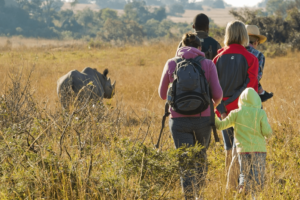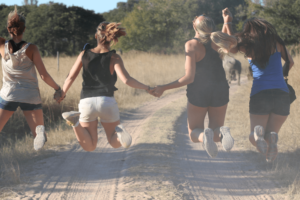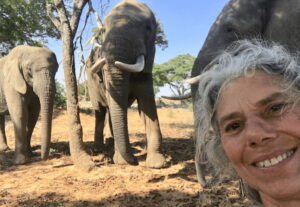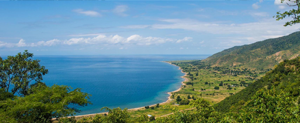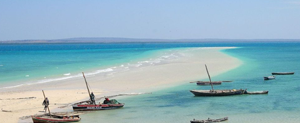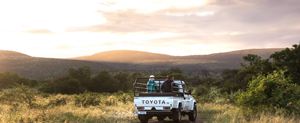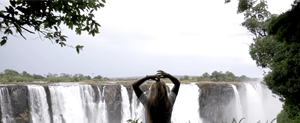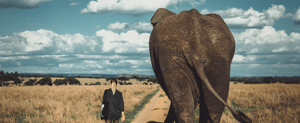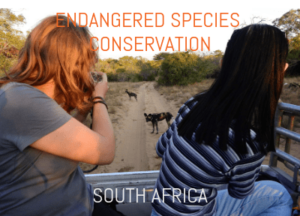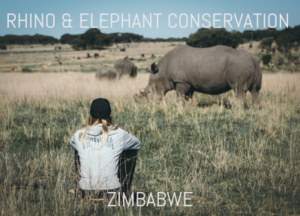American volunteers, Jim and Steve, wrote to us about their ‘bucket list’ volunteering trip to Africa and how it turned into absolutely the trip of a lifetime.
We asked them to share their experiences and give us their reasons why they recommend volunteering for seniors in Africa.
“This past August, I and a friend spent 4 weeks volunteering on two Conservation Travel Africa programs. We are both in our early 70’s and were a little apprehensive about our ability to do the physical work needed, and about traveling on our own through counties with political and cultural differences, very different from any we ever experienced. Here is our experience with some advice to make your trip run smoothly.
“First, a little background. This was my ‘bucket list’ trip. I’ve been an African elephant lover since I was a teenager; reading dozens of books and collecting hundreds of prints, statues, carvings, etc. My objectives were to experience them in the wild and, to the extent possible, interact with them on a personal level (i.e., touching). Working with Morgan, I chose the Tembe Elephant Park in South Africa and Imire Rhino Conservancy in Zimbabwe.
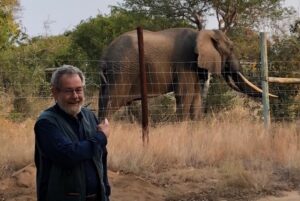
“While my observations and experience are specific to these two conservation programs, I suspect they would apply to any of the CTA programs.
- Read and re-read all of the literature for the program(s) you’re interested in.
- Believe what you read. When they say “bring clothing that you can layer – it can be cold riding in the back of the truck in the early morning” believe it.
- If the program literature is unclear or doesn’t address a particular question you have, ask your travel coordinator. Morgan was very patient answering my dozens of questions in the months before our trip. The net result was a perfect trip with no surprises.
- Get all of the recommended vaccinations for the countries you’ll be visiting. Start early as some vaccinations require multiple shots. This can be expensive and may require multiple trips, but consider the alternatives.
- Some programs are more physical than others. Tembe work was mostly radio tracking, recording results, and observation from the back of a pickup. However the days were long (often on the road at 4:30am and finishing around 7:00pm). Imire, on the other hand, was much more physical with daily work sessions (around 3 hours) that contribute to upkeep and improvement of the conservancy (one project was to help build a bridge over a stream), lots of walking (learning how to track a black rhino and line walking the bush along a pond looking for poaching snares). Know that you can always opt out of any activity that is too physical for you or you are just too tired to do. Having said that, realize that some of the best animal encounters can happen while traveling to or from these working sessions.
- Pack any and all OTC and first-aid medications that you may need. Many of the medications we take for granted at home are not available at or near these program sites. The ones you are most like to need are pain reliever for sore muscles and an antibiotic cream and bandages for cuts and scrapes. I packed a full blown travel first aid kit that, fortunately, I never used.
- Know that your follow volunteers will, mostly likely, be younger (in the 2 weeks we were at Imire, three of the volunteers were 17 years old). Befriend them and take an interest in their home country. It can be a real learning experience. Be yourself but don’t try to parent them.
- Money. On our two programs, use of credit cards and ATMs ranged from very limited to non-existent. Carrying large amounts of cash (whether USD or local currency) was a big concern for me. In Zimbabwe the USD was the preferred currency but making change could not be expected. This required me to carry lots of small denomination bills. After researching all sorts of ways to carry money while traveling (money belts to pocketed underwear) my solution was to simply put the cash in a small zippered pouch and keep it in my backpack when traveling and buried in my suitcase when on site. Both programs offered safes but I never felt to need to use them.
- Read a little about the history, culture and language(s) of the region you will be visiting. Many of the people you encounter will be native to the area and appreciate volunteers that take an interest in their daily lives. Be cautious about discussing politics.
“On a final note, if you are trying to decide between a volunteer program or a typical “safari” trip, know this:
For our long hours and physical labor we got to do and see things that are not part of luxury safaris.
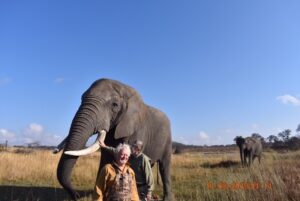
-
- See parts of the park that are available only to rangers and researchers
- Get a good basic understanding of the animal conservation challenges of the park and Africa in general
- See nocturnal animals on early morning drives
- Work and socialize with researchers and animal experts
- Touch and feed elephants and rhinos
- Observe a 5 day old baby black rhino
- See a pride of lions that had not been seen in 18 months
- Help with the release of painted dogs in the park
- Visit a typical village in the surrounding communities to learn their lifestyles, work with school children, and distribute donated clothing and school supplies
- Get a real understanding of “TIA” (This Is Africa)
While a few weeks working with conservation specialists will never give us the in-depth knowledge they have on all the issues they face with managing and protecting the African animal ecosystem, we came away with a basic understanding of the major issues with saving species and their impact on the local communities.”
– – – – – – – – – – – – – –

